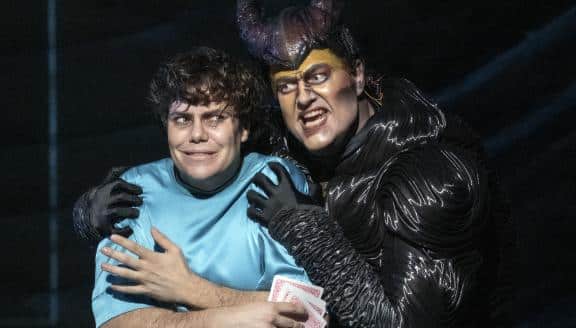Operatic Descent into Madness
OperaThis Friday Slippedisc, courtesy of OperaVision is in Oslo for Norwegian National Opera’s new production of The Rake’s Progress, Stravinsky’s neoclassical dark comedy.
Igor Stravinsky wrote The Rake’s Progress in 1951, based on eight satirical paintings by Hogarth, with W. H. Auden as his brilliant librettist-collaborator. Auden’s gift for investing verse in simple metres with rich meanings perfectly suited Stravinsky’s need for variable patterns. Stravinsky shamelessly borrowed from other operas and composers. Although the work seems at first sight like a straight 18th-century pastiche, complete with secco recitative accompanied by harpsichord, it is one of Stravinsky’s most complex and many-tiered scores. The influence of Mozart is obvious. The verse-and-refrain form is typical of Stravinsky’s lifelong interest in ritual forms with repetition. For the story, Auden set up a pastoral idyll. Tom is Adonis, who comes to a bad end for disobeying the command of his goddess lover, Venus. Cut off from his moral roots, he falls prey to philosophies of moral nihilism – and is about to succumb when the still small voice of love brings him back to his senses, or at least to life (as the former seem pretty lost). So a mixture of antique conventions provides a frame for a strictly modern fable, just as in the music. Director Vidar Magnussen has returned Norwegian National Opera to toy with our perceptions of reality in this ‘horror show’ of a performance. He takes us inside Tom Rakewell’s head on a wild journey from riches and a life of luxury to poverty and insanity. Borrowing from the aesthetics of the 1950s and 60s, Magnussen creates a dark universe in the form of an absurd, burlesque fantasy world.
The Plot: a machine that turns stones into bread, a bearded lady, a mental hospital and love. This is a journey down a delightfully dark spiral into the mind of a Tom Rakewell. For Tom, the combination of being lackadaisical and greedy is dangerous; and he learns the hard way. He is madly in love with the kind-hearted Anne Trulove, but there’s a hitch – her father wants Tom to have a job, but Tom feels he is not cut out for a life of drudgery! Fortunately, the diabolical Nick Shadow shows up and announces an opportune money inheritance from an obscure uncle, so Tom goes to London in search of happiness… and meets madness on the way.
Friday 22 November at 1900 CET/ 1800 London / 1300 New York






Comments